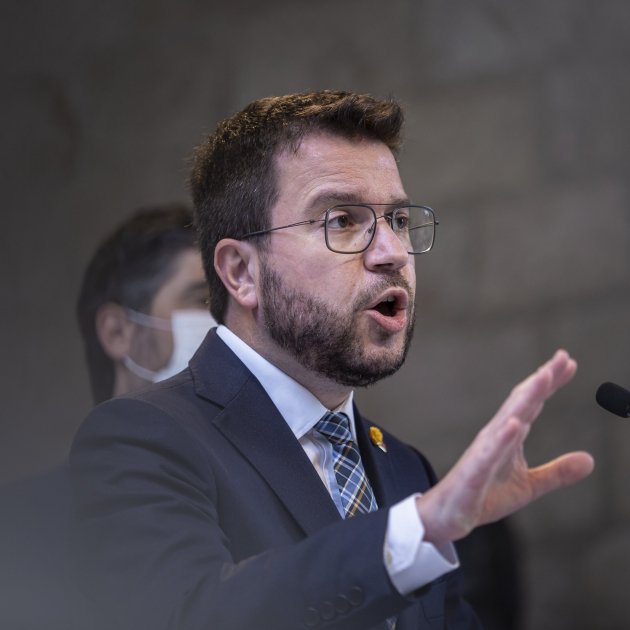Wanted: transparency and accountability from Pedro Sánchez. The president of Catalonia, Pere Aragonès, has this Wednesday repeated that it is up to the Spanish government to take action to respond to the CatalanGate cyberespionage revelations, but he avoided accusing the Spanish executive directly, after being asked whether he thought Pedro Sánchez had knowledge of what was happening: "It would be pure speculation and it's a very serious matter." But if Aragonès did not point the finger at political leaders, he did name one of the Spanish government organs: "You don't have to be Sherlock Holmes to point out the CNI".
The reference to the CNI, Spain's intelligence agency, was made by the Catalan leader in an interview with radio station RAC1, two days after the breaking of the controversy under which more than 60 pro-independence activists and other individuals are known to have been spied on using Pegasus spyware. Aragonès reiterated his desire for a "face to face" meeting with Spanish PM Sánchez, although he could not say if such a meeting would be between presidents or between their teams. In fact, the president revealed that today Sánchez was due to come to Barcelona to open a business, with Aragonès also supposed to attend, but the Catalan president told him that it made no sense to coincide as if nothing had happened and finally Sanchez did not come.
In any case, just as he did yesterday in a statement from the Palau de la Generalitat, Aragonès reasserted that relations with the Spanish government have been damaged and that it is essential to know what happened, who ordered it, which government organ it was under and who knew who about it, and from there, to assess the appropriate measures and resignations: "Confidence is at very low levels," he insisted, saying that at this time the relationship with Spain is "highly damaged", but not broken. Thus, the Catalan president assured that they will continue to hold meetings of a "technical nature" such as for the 2030 Winter Olympics bid, and that then each member of the Catalan administration will assess whether or not meetings of a more political nature are held.
Borràs: the dialogue table is dead
If, when asked, the Catalan president once again defended the path of dialogue with the Spanish government over the political conflict, a very different position was mapped out by the speaker of the Catalan Parliament, Laura Borràs, in her own radio interview this morning. On El Matí de Catalunya Ràdio, she demanded the resignation of the Spanish prime minister, as well as the heads of the interior and defence ministries, Fernando Grande-Marlaska and Margarita Robles respectively, over the CatalanGate debacle, assuring that it was past time to ask for explanations. She also announced that she would mobilize Parliament to take a legal offensive.
As one of the 65 people known so far to have been victims of the espionage, Borràs wanted to convey the fragility she had felt in knowing that she had been spied on for a long time, explaining how she had changed her mobile phone and complied with a series of recommendations from the experts. Borràs also made a clear call for the unity of independence, recalling the joint press conference held on Tuesday in Brussels to denounce the massive espionage. "From Junts we never tire of repeating that when we are united is when we move forward the most." According to her, this unity is about definitively leaving the dialogue table with the Spanish state, in which the Sánchez government has shown great disinterest: "The table was born dead and is now buried. We've talked a lot about it but the table has never existed. It's legitimate for ERC to want to believe in the table, but now it's time for independence to recover its strategic unity."
